Dogs
10 Reasons Why Dogs Lick Your Feet
Satisfy your curiosity about why dogs lick your feet – the reasons behind this behavior will surprise you!

When our four-legged companions lick our feet, they are demonstrating affection and deepening the bond we share with them. Dogs lick feet to garner attention and build a unique connection. It is their way of conveying love and grooming us, showcasing their innate desire to nurture humans.
This behavior also helps alleviate stress, as licking triggers the release of endorphins providing comfort. Understanding why dogs lick our feet can deepen the emotional connection we share with our canine companions.
Key Takeaways
- Dogs lick feet for attention and affection.
- Licking is a form of positive interaction.
- It signifies love and bonding.
- Can be a habit seeking attention.
- Reflects dogs' desire for connection.
Canine Affection and Bonding
When dogs lick your feet, they're expressing their affection and strengthening the bond they share with you.
This act of dog licking isn't just a random behavior; it's a way for our furry friends to show love and care towards us.
Dogs have a natural instinct to bond with their human companions, and licking is one of the ways they communicate this connection.
It might seem like a simple gesture, but it holds significant meaning in the canine world.
Seeking Attention and Interaction
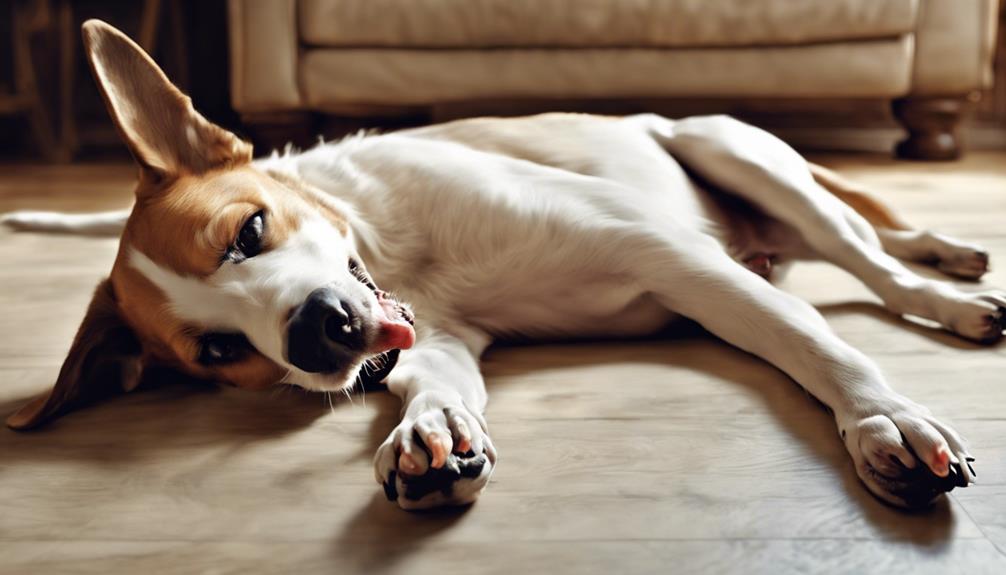
We've all experienced those moments when our furry friends seem to demand our attention in the most adorable ways.
When dogs lick our feet, it's often their way of reaching out to us and craving interaction.
This behavior creates a special bonding experience between us and our loyal companions, enhancing the joyful connection we share.
Attention-Seeking Behavior Explained
Dogs often lick your feet as a way to seek attention and interaction from you. It's their way of connecting with you and getting your focus.
When your furry friend licks your feet, they may be trying to engage with you in a playful manner, hoping to make you laugh or react. This behavior is a form of positive attention-seeking from your dog, showing their desire for your company and affection.
Simply put, your dog may lick your feet because they enjoy the interaction and attention it brings. So, next time your dog licks your feet, remember that it's their way of showing love and seeking your attention in a cute and endearing manner.
Interaction Through Licking
Seeking attention and interaction, dogs often express their desire for engagement by licking your feet as a way to connect with you. When your dog engages in licking behavior, it's their way of seeking attention and establishing a bond with you.
This interaction through licking is a natural instinct for dogs to communicate their needs and express their desire for closeness. By responding positively to their licking, you reinforce this form of communication, deepening the bond between you and your furry friend.
Human-Dog Bonding Activity
During moments of bonding, dogs may express their desire for attention and interaction by licking your feet. This act of licking serves as a way for dogs to strengthen their relationship with you.
By seeking positive attention through foot licking, dogs engage with their owners on a deeper level. The affection displayed through this behavior is a form of communication, allowing dogs to express their needs and emotions.
When your dog licks your feet, it's a gesture of love and connection, showing their desire for closeness and companionship. Embrace these moments of bonding, as they're essential for nurturing a strong and trusting relationship with your furry companion.
Natural Instincts and Social Behavior
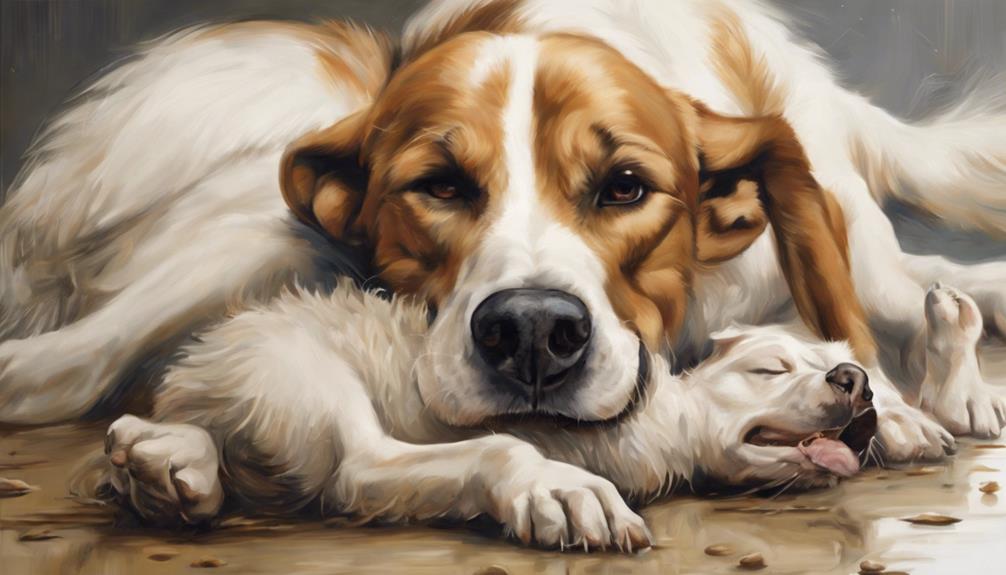
As dog owners, we often wonder why our furry companions engage in certain behaviors like licking our feet. Understanding that this behavior is rooted in their natural instincts and social behaviors is essential.
Dogs use licking as a way to communicate, groom, and bond with their human family members. By recognizing these innate tendencies, we can foster a stronger emotional connection with our beloved pets.
Canine Social Interactions
In understanding canine social interactions, it becomes evident that dogs utilize their natural instincts and social behaviors to communicate and bond with humans. Dogs licking your feet is a way for them to show affection, seek attention, and express their emotions. They use this behavior to connect with you and strengthen the human-canine relationship. Here is a table to provide a deeper insight into canine social interactions related to licking feet:
| Canine Social Interactions | Description |
|---|---|
| Affection | Dogs show love and bond by licking your feet. |
| Communication | Licking is a way for dogs to express emotions. |
| Attention Seeking | Dogs may lick feet to seek interaction with you. |
| Scent Exploration | Exploring scents on your feet is intriguing for dogs. |
Innate Grooming Behavior
Dogs instinctively engage in grooming behaviors, including licking feet, as a way to demonstrate care and establish social bonds with humans. This innate grooming behavior is deeply rooted in their natural instincts for cleaning and social interaction.
When your dog licks your feet, it's a reflection of their need to care for you, mirroring the grooming gestures they'd offer to their pack members. By licking your feet, dogs express affection and seek to strengthen their social connections with you, their human companion.
Understanding this aspect of their behavior can help you appreciate the bond you share with your furry friend and nurture a deeper connection based on mutual care and companionship.
Bonding Through Licking
Pivoting from the previous discussion on innate grooming behavior, understanding why dogs lick your feet sheds light on the natural instincts and social behaviors that underlie this bonding ritual. Dogs have an incredible sense of smell, allowing them to identify their owners through scent. Through bonding through licking, dogs establish a deep connection with their humans, reinforcing their place in the pack hierarchy. This behavior is not just about licking; it's a form of communication that expresses affection, care, and submission. By engaging in this ritual, dogs convey trust and build intimacy with their owners, creating a strong bond that transcends words. Below is a table highlighting the significance of bonding through licking:
| Bonding Through Licking |
|---|
| Strengthens Connection |
| Expresses Affection |
| Communicates Trust |
| Builds Intimacy |
| Enhances the Human-Canine Relationship |
Exploring Taste and Smells
Exploring the tastes and smells of feet entices dogs due to the rich array of pheromones and scents present. When dogs lick our feet, they aren't only savoring the salty taste derived from sweat and salt but also indulging in a sensory adventure.
The intriguing blend of different scents emanating from our feet captivates their superior sense of smell, which far surpasses our own. Dogs are naturally drawn to the unique odors that feet carry, providing them with a stimulating experience that goes beyond mere taste.
The act of licking feet allows dogs to immerse themselves in a world of scents and flavors that we may not even be aware of. Their keen exploration of the taste and smell on our feet showcases their innate curiosity and desire to engage with the world around them in a deeply sensory manner.
Stress and Anxiety Relief

When feeling stressed or anxious, licking feet can serve as a soothing and comforting action for our canine companions. Dogs have a natural instinct to seek ways to alleviate their stress, and licking feet is one of the methods they use for stress relief.
The act of licking triggers the release of endorphins in dogs, which are hormones that help reduce stress levels and provide a sense of comfort. This behavior can be especially noticeable during times of heightened anxiety, as dogs may turn to licking as a self-soothing mechanism.
Health and Hygiene Purposes

We all know that dogs licking our feet might seem a bit strange, but it actually serves a purpose.
When dogs lick our feet, they're not just being affectionate; they're also helping to keep our feet clean.
Grooming and Cleanliness
For dogs, licking your feet serves as a natural grooming instinct that aids in maintaining their hygiene and health. When a dog licks your feet, it's their way of helping to keep both you and themselves clean.
Dogs have a keen sense of smell and can detect even the slightest odors, so licking your feet may be their way of removing any unwanted scents or dirt they sense. This grooming behavior is deeply ingrained in their instincts, as it helps them remove bacteria, dirt, and foreign particles that could cause infections.
Additionally, a dog's saliva contains antibacterial properties that can assist in cleansing wounds and promoting healing. So, next time your furry friend gives your feet a lick, remember it's their way of showing care and maintaining cleanliness.
Preventing Infections and Illnesses
To ensure your dog's well-being and prevent potential infections and illnesses, it's crucial to understand the impact of their licking behavior on both their health and yours. Here are some key points to bear in mind:
- Excessive licking of feet can introduce harmful bacteria and germs, leading to infections.
- Saliva from a dog's mouth may contain pathogens that can cause skin irritation or allergies.
- Open wounds or cuts on the feet can be susceptible to infection if licked excessively.
- Dogs licking feet can transfer parasites like fleas or ticks, increasing the risk of infestation.
- Maintaining foot hygiene and preventing excessive licking can help avoid potential health issues.
Mimicking Pack Behavior
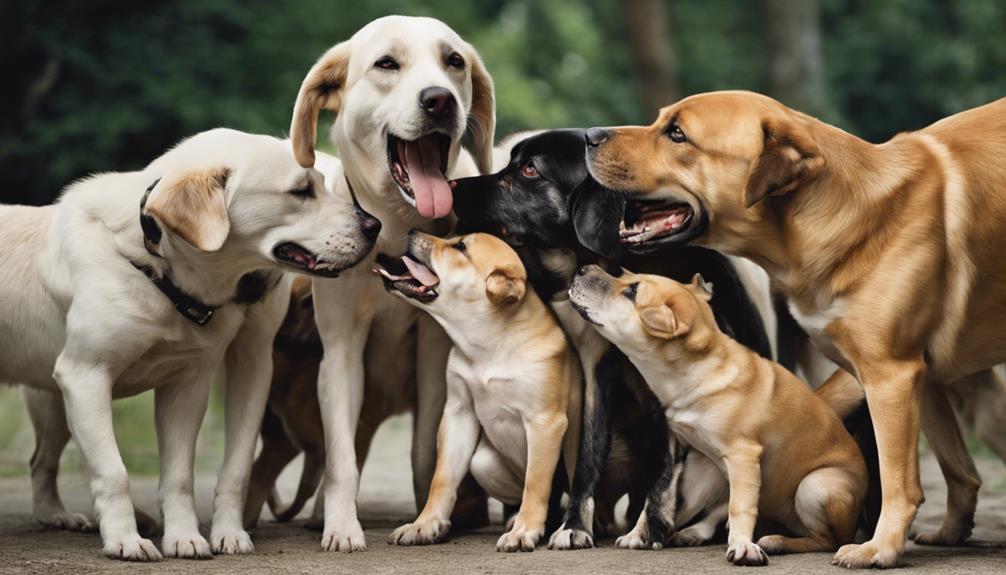
When dogs lick your feet, they might be engaging in a behavior that mimics pack dynamics and social grooming practices. This behavior stems from their instinctual need to bond and communicate within their social group, which includes their human family members. By licking our feet, dogs are expressing their affection and reinforcing their connection to us as part of their pack. This act of social grooming helps dogs establish and maintain their social hierarchy within the family unit, much like how they would interact with other members in a pack setting.
To better understand why dogs lick our feet as a way of mimicking pack behavior, let's take a closer look at how this behavior aligns with their natural instincts:
| Mimicking Pack Behavior | Social Grooming |
|---|---|
| Helps bond with family | Reinforces social bonds |
| Expresses affection | Establishes social hierarchy |
| Strengthens connections | Mimics pack dynamics |
| Shows loyalty | Promotes social cohesion |
| Establishes social order | Builds trust |
Communication and Expression
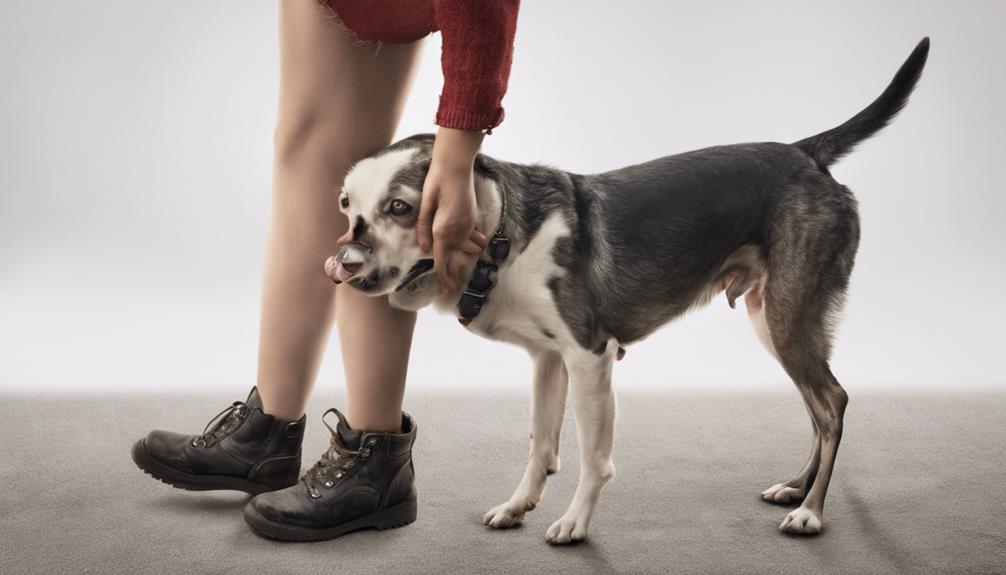
Dogs communicate and express their feelings through licking your feet, a behavior that serves as a form of interaction and bonding. When your furry friend engages in this behavior, they're trying to convey various messages:
- Affection: Licking your feet is a way for dogs to show their love and attachment to you.
- Attention-Seeking: Your dog may lick your feet to grab your attention and seek interaction.
- Calming: Foot licking can be a self-soothing mechanism for dogs, helping them relax in stressful situations.
- Expression of Happiness: Dogs often lick feet when they're excited or happy to see you.
- Bond Strengthening: Understanding and reciprocating your dog's foot licking can deepen the bond between you and your pet.
Habitual Behavior and Reinforcement
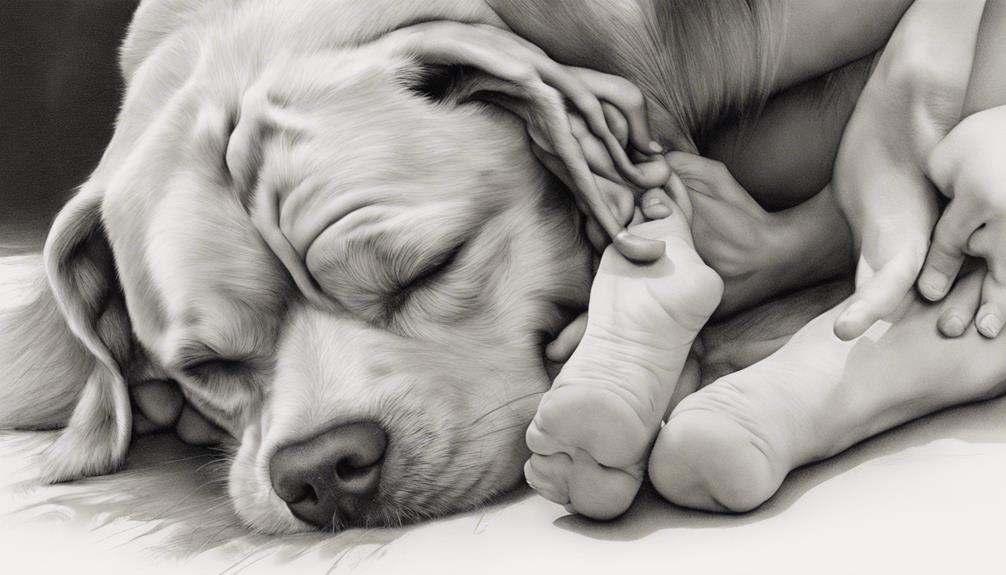
As pet owners, we often find ourselves unknowingly reinforcing our dogs' habitual foot licking behavior through positive attention and interaction. Dogs are quick learners and can associate licking feet with receiving affection, making it a behavior that they repeat to seek attention. This positive reinforcement loop can lead to foot licking becoming a habit for our furry friends. It's essential to understand that dogs seek attention and connection with us, and when they receive positive reinforcement for licking our feet, they are likely to continue this behavior.
| Positive Reinforcement | Habitual Behavior | Dogs Licking Feet |
|---|---|---|
| Owners petting dog when licking feet | Dog associates foot licking with attention | Becomes a repetitive behavior |
| Verbal praise for licking behavior | Dog seeks interaction through licking feet | Reinforced through positive attention |
| Offering treats when dog licks feet | Dog learns that foot licking leads to rewards | Establishes licking as a habitual action |
| Engaging in play after foot licking | Dog connects licking with playtime | Encourages continued foot licking |
| Ignoring foot licking | Dog may stop behavior if not reinforced | Lack of attention may decrease habituation |
Seeking Comfort and Security
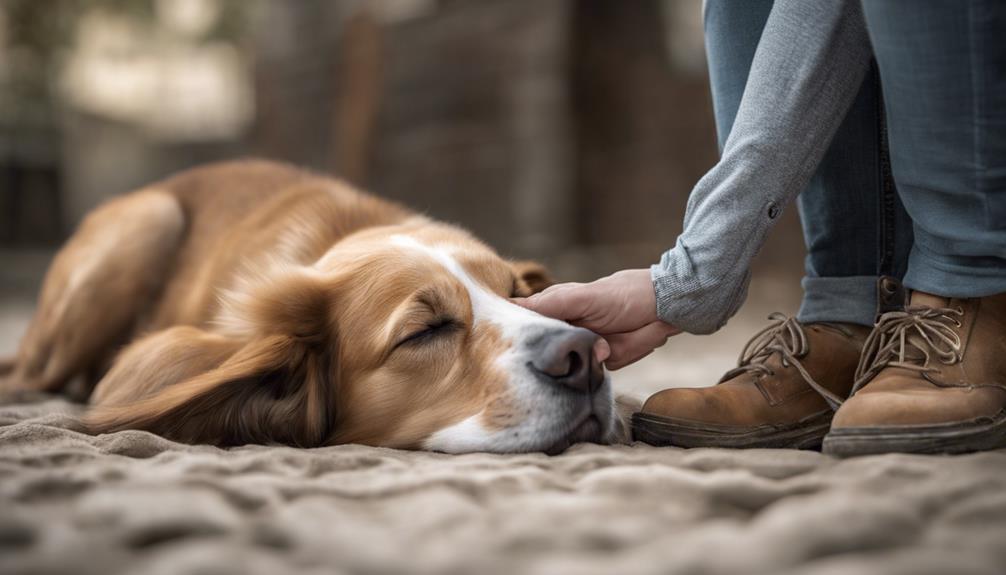
Licking feet can serve as a comforting and reassuring behavior for our canine companions. When dogs engage in this behavior, they're often seeking comfort and security in various ways:
- Relief from Anxiety: Dogs may lick your feet to help alleviate feelings of anxiety or stress, finding solace in this repetitive action.
- Seeking Reassurance: By licking your feet, dogs seek reassurance and comfort from their owners, looking for a sense of safety and protection.
- Natural Behavior: Seeking comfort through licking feet is a natural instinct for dogs, helping them cope with challenging situations.
- Calming Gesture: Licking feet can be a calming and comforting gesture for dogs, particularly in unfamiliar or stressful environments.
- Sense of Security: This behavior can provide dogs with a sense of security and stability, offering them a source of emotional support in times of need.
Understanding why dogs lick feet to seek comfort and security can deepen the bond between you and your furry friend while addressing any underlying emotional needs they may have.
Frequently Asked Questions
What Does a Dog Licking Your Feet Mean?
When a dog licks your feet, it can mean various things, like seeking attention, showing affection, or exploring scents. This behavior may also indicate comfort-seeking or a way to bond with you. Understanding why dogs lick feet can deepen your relationship with your furry friend and enhance communication.
Why You Shouldn't Let Your Dog Lick Your Feet?
Ensuring our dogs lick our feet may seem harmless, but it can pose risks to our health. Dog saliva contains bacteria that, if transferred to our skin, can lead to infections, especially if there are any open wounds.
We should consider the hygiene implications and our personal comfort when deciding whether to allow this behavior. Upholding boundaries for both our well-being and that of our furry friends is crucial.
Why Do Dogs Lick Stinky Feet?
When dogs lick stinky feet, it could be due to the intriguing odors and pheromones present that appeal to their sensitive sense of smell.
The salty taste and unique scents from sweat and bacteria may attract dogs to lick feet as a way of exploring their environment and gathering information.
Additionally, licking stinky feet may also serve as a bonding behavior, allowing dogs to engage with their owners and elicit a response.
How Do I Get My Dog to Stop Licking Her Paws?
When it comes to stopping your dog from licking her paws, understanding the root cause is essential. Paw licking can indicate various issues, from allergies to infections. Observing your dog's behavior and consulting a veterinarian for a proper diagnosis is a wise first step.
What Could Be the Reasons Behind a Dog Licking Feet and Toes?
Canine behavior licking toes may be due to various reasons such as showing affection, seeking attention, or simply out of curiosity. It could also indicate potential health issues like allergies, skin irritation, or anxiety. Observing the context and frequency of this behavior can help decipher the underlying cause.
Conclusion
To sum up, dogs lick our feet for a variety of reasons, from seeking attention and affection to exploring tastes and smells. It's a natural behavior that can also be a sign of stress relief or communication.
Remember, 'dogs are a man's best friend' for a reason – their actions are often driven by their desire to bond with us and express their emotions. So next time your furry friend licks your feet, remember the bond you share and enjoy the moment of connection.
As our Editor-in-Chief, James plays a pivotal role in ensuring the quality and integrity of our content. With a keen eye for detail and a passion for storytelling, James oversees the editorial process here at A Place for Animals. With years of experience in content editing, James ensures that every piece of content meets our high standards of accuracy and clarity. Under James’ guidance, you can rest assured that the content you read is informative and impeccably crafted.
Dogs
The Origins of Ebons Name
Nurture your curiosity about the enigmatic origins and powerful connotations of the name 'Ebon.

The name 'Ebon' originates in Old English, tied to ebony wood in the 15th century. It transformed to represent intense blackness by the 1590s. Latin influences give it power, elegance, and mystery, creating a name of grandeur and timelessness. In various cultures, 'Ebon' signifies strength, mystery, elegance, power, and authority. Variants like Ebony and Ebenezer hold biblical meaning. The name also connotes resilience, intelligence, history, and tradition, appealing universally with enduring qualities. The historical significance of 'Ebon' includes references to ebony wood and intense blackness, symbolizing resilience, determination, and mystery. More insights await on this fascinating name's journey.
Key Takeaways
- 'Ebon' originated from Old English in early 15th century.
- Initially tied to the adjective form of ebony.
- Evolved to symbolize intense blackness by 1590s.
- Latin and Greek roots imbue 'Ebon' with power and elegance.
- Historical reference to skin color of Africans by 1813.
The Old English Origins of 'Ebon'
The term 'Ebon' reveals its roots in Old English, tracing back to the early 15th century. Originally associated with the adjective form of ebony, a dark and hard wood highly valued for its various uses, 'Ebon' has evolved to symbolize intense blackness, a concept noted as early as the 1590s.
In the context of last names, 'Ebon' has historical ties to the color black, reflecting the rich tapestry of its linguistic journey. The adoption of 'Ebon' as a last name signifies a connection to heritage and a nod to the deep and profound shades of black that have inspired awe and admiration for centuries.
As we explore the origins of 'Ebon,' we expose a narrative that intertwines linguistic evolution with cultural connotations, offering a glimpse into the intricate web of meanings encapsulated by this ancient term.
The Latin Influence on 'Ebon'

With its roots deeply intertwined in Latin and Greek languages, 'Ebon' exudes a timeless allure that echoes notions of strength, elegance, and mystery. The Latin influence on 'Ebon' is profound, reflecting its association with power and authority. The name's Latin origins highlight its classic appeal and deep historical significance, adding a layer of sophistication to its meaning. Below is a table showcasing the Latin influence on 'Ebon':
| Latin Influence | Meaning | Symbolism |
|---|---|---|
| Potestas | Power | Authority |
| Elegans | Elegance | Sophistication |
| Mysterium | Mystery | Intrigue |
| Fortitudo | Strength | Resilience |
| Auctoritas | Authority | Leadership |
The Latin roots of 'Ebon' infuse the name with a sense of grandeur and timelessness, making it a compelling choice rich in cultural significance.
The Meaning of 'Ebon' in Different Cultures
Exploring the significance of 'Ebon' across various cultures reveals its multifaceted meanings and associations beyond its Latin roots. In Latin and Greek cultures, the name 'Ebon' carries the powerful connotations of 'black' or 'dark,' symbolizing strength and mystery. This name is deeply intertwined with resilience and intelligence, embodying a profound connection to history and tradition.
Across different cultures, 'Ebon' is synonymous with elegance, power, and authority, drawing from its ancient Roman and Greek origins. Its timeless and classic appeal speaks to sophistication and depth, making it a name of enduring quality. Variants such as Ebony, Eben, and Ebenezer also bear historical and biblical significance, offering unique twists on the name 'Ebon.'
These names hold a rich tapestry of meanings that transcend borders, showcasing the universal allure of 'Ebon' and its variations in the world of names.
Historical Significance of the Name 'Ebon'

Delving into the historical significance of the name 'Ebon' uncovers a rich tapestry of connections to materials, cultures, and symbolism.
- Baby Name Associations:
The name 'Ebon' originated in the early 15th century and is linked to ebony, a dark, hard wood favored for various uses. Its figurative use for intense blackness dates back to the 1620s, with an adjective form emerging in the 1590s.
- Material Connotations:
The term 'Ebonite,' coined in 1860, combines 'ebon' and '-ite' to signify a related material or substance, emphasizing its historical ties to strength and durability.
- Cultural References:
By 1813, 'Ebon' had a historical reference to the skin color of Africans, reflecting its association with darkness and intensity while also symbolizing elegance and mystery rooted in ancient Roman and Greek cultures.
- Symbolism of Resilience:
The name 'Ebon' signifies resilience and determination, echoing themes of strength and mystery in various historical contexts, making it a meaningful choice for parents seeking a name with depth and significance.
Evolution of the 'Ebon' Surname
The surname 'Ebon' underwent a transformation over the centuries, reflecting its deep-rooted connection to the symbolism of dark, hard wood. Originating in the early 15th century, 'Ebon' derived from the word 'ebony,' signifying the characteristics of this material. By the 1620s, it had evolved to convey intense blackness, capturing the essence of ebony. The term 'Ebonite,' introduced in 1860, further expanded on this association, referring to a related material or substance akin to ebony.
Through the years, 'Ebon' became intertwined with concepts of skin color and holds a historical tie to African heritage. This evolution mirrors the shifting societal perceptions and associations with darkness and blackness. The popularity of names often reflects these underlying cultural currents, showcasing how 'Ebon' has adapted and resonated with different generations.
Frequently Asked Questions
What Is the Meaning of Ebons?
Ebons means 'black' or 'dark', embodying strength, elegance, and mystery. It reflects resilience and determination from ancient Roman and Greek roots. Intelligence, intuition, and a timeless appeal are qualities associated with it.
What Does Ebon Name Mean?
We love the name Ebon. It means 'black' or 'dark', representing strength, elegance, and mystery. A timeless choice that exudes power and authority. Ebon's rarity and modern edge make it a unique and compelling name.
What Is the Origin of the Word Ebon?
We found the word "ebon" originates from Latin and Greek roots, symbolizing strength, elegance, mystery, power, and authority. It evolved to describe intense blackness. The term was used for various items and associated with African skin color.
What Does "Ebon" Mean in Greek?
In Greek, 'Ebon' means 'dark' or 'black,' embodying qualities of strength, elegance, and mystery. Its association with intensity and depth adds a timeless appeal. The name symbolizes power, authority, and sophistication.
Conclusion
To sum up, the origins of the name 'Ebon' are as mysterious and complex as the darkness it represents. From Old English roots to Latin influences, the name has evolved over time to carry different meanings in various cultures.
Its historical significance and evolution as a surname add layers to its intriguing story. So next time you come across someone named Ebon, remember the rich history behind this enigmatic name. It's more than just a label, it's a window into the past.
As our Editor-in-Chief, James plays a pivotal role in ensuring the quality and integrity of our content. With a keen eye for detail and a passion for storytelling, James oversees the editorial process here at A Place for Animals. With years of experience in content editing, James ensures that every piece of content meets our high standards of accuracy and clarity. Under James’ guidance, you can rest assured that the content you read is informative and impeccably crafted.
Dogs
7 Angry Cat Names That Exude Fierceness
Tap into your cat's wild side with these fierce names that scream power and strength – find out which one will suit your feline warrior best!

When selecting a name for your fierce feline, opt for lion-inspired monikers like Leo, Roar, or King for regal power. Warrior-themed names such as Ninja, Gladiator, and Samurai bring out strength and prowess. Mythical options like Gandalf or Legolas add a touch of mystique. Nature-inspired picks like Thunder or Avalanche evoke raw force. Villainous choices such as Maleficent or Loki exude a dark charm. Explore these fierce and strong cat names to find the perfect fit for your fiery feline. Further reveal your cat's ferocity with these intriguing name options.
Key Takeaways
- Opt for names like Shadow, Vortex, or Venom for a fierce vibe.
- Choose names such as Diablo, Banshee, or Nemesis for a dark and powerful aura.
- Consider names like Havoc, Chaos, or Fury to showcase intense energy.
- Select names such as Ghost, Wraith, or Phantom for a mysterious and menacing feel.
- Pick names like Eclipse, Inferno, or Ravage for a strong and aggressive presence.
Lion-Inspired Cat Names
When selecting names for feline companions, considering lion-inspired monikers can accentuate their regal and commanding presence. Badass cat names like Leo, Roar, and Mane evoke the strength and dominance associated with lions. These names can bring out the fierce and fearless nature of your cat, adding a touch of royalty and dominance to their personality.
Names such as King and Pride can symbolize leadership and confidence in your feline friend. Embracing these lion-inspired monikers not only showcases your cat's majestic aura but also highlights their inner power and independence.
Warrior-Themed Cat Names
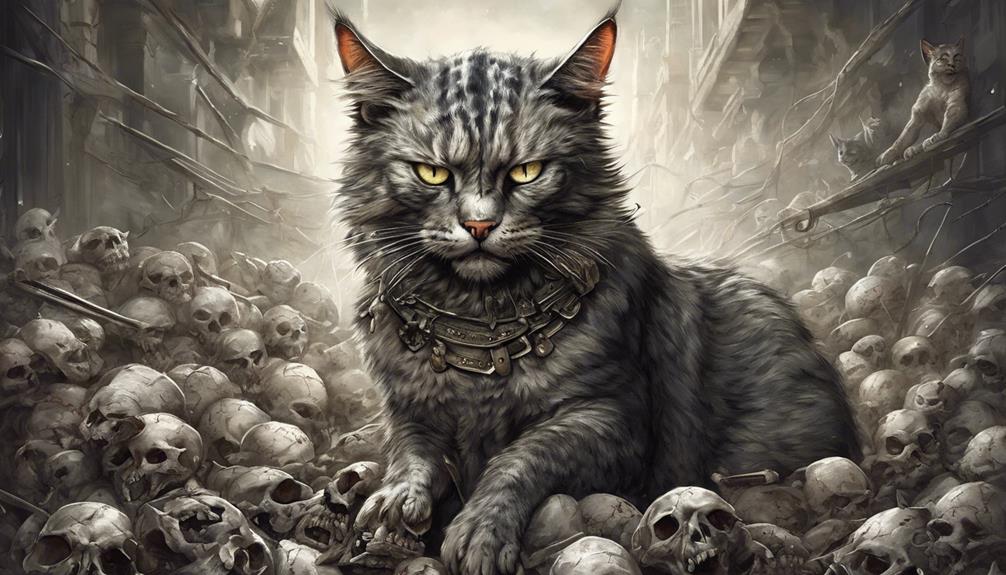
When selecting a name for your female cat that mirrors her bold and brave personality, consider options like Valkyrie, Ninja, Gladiator, Samurai, or Warrior. These names not only convey a feeling of power and valor but also capture your cat's fearless demeanor and adventurous spirit.
Opt for a name that resonates with your cat's unique characteristics and showcases her inner warrior. Female cats with warrior-themed names are often viewed as independent, daring, and full of determination.
Mythical Cat Names
Mythical cat names bring an air of mystique and power to your feline companion's persona, adding a touch of enchantment to their identity. When considering names inspired by legends and mythology, one popular source of inspiration is the epic fantasy world of Lord of the Rings. Names like Gandalf, Arwen, Legolas, or even Smaug can bestow upon your cat a sense of grandeur and otherworldly charm.
Drawing from the rich tapestry of mythical creatures and characters in Lord of the Rings, you can choose a name that reflects qualities such as strength, beauty, or wisdom. Whether your cat embodies the grace of an elf or the cunning of a dragon, these names offer a unique opportunity to celebrate your cat's majestic and mysterious nature.
Nature-Inspired Cat Names

Let's explore nature-inspired cat names that capture the essence of the wild and fierce. Nature-inspired names such as Thunder, Blaze, Avalanche, Tempest, and Tsunami can make great choices for your fierce feline companion. These names draw inspiration from powerful forces of nature, reflecting a cat's untamed and strong nature.
Cats bearing these names often exude a sense of strength and fierceness, embodying the characteristics of natural phenomena. Opting for a nature-inspired name can add a unique and impactful touch to your cat's persona and demeanor. Popular choices for fierce cats include Wildfire, Chaos, Beast, Fury, and Havoc.
Each of these names carries a sense of power and intensity, perfect for a cat with a fiery spirit. When selecting a nature-inspired name for your cat, consider the traits and qualities that resonate with you and your cat's personality, ultimately creating a name that truly embodies their wild and fierce nature.
Villainous Cat Names
Villainous cat names are perfect for felines with a dark and mysterious aura. These monikers draw inspiration from famous villains in popular culture, adding intrigue and power to your cat's persona.
Whether your cat is a sweetie with a dark side or a true troublemaker, a villainous name can make them stand out and showcase their unique personality.
Sinister Cat Monikers
What makes sinister cat monikers like Maleficent, Loki, Ursula, Jafar, and Cruella so intriguing and mysterious? Choosing a villainous name for your cat can be the perfect way to showcase their fierce and formidable side.
These names, inspired by infamous fictional villains, add a touch of darkness and intrigue to your feline friend's persona. Opting for a sinister cat moniker can reflect your cat's mischievous or cunning nature, giving them an air of power and mystique.
Names like Maleficent or Loki are perfect for cats with rebellious or enigmatic personalities, adding a sense of mystery and danger. Embracing a villainous cat name can be a fun and creative way to highlight your cat's darker, more mysterious side.
Wicked Feline Titles
Exploring the realm of sinister feline designations reveals a fascinating array of malevolent cat names that exude a sense of darkness and allure. Names inspired by notorious villains like Maleficent, Loki, Ursula, Jafar, and Cruella add a touch of mystery and mischief to your cat's persona.
These wicked feline titles draw from movies, fairy tales, and myths, infusing your cat with a rebellious and cunning nature. Ideal for cats with a mischievous aura, these names bring drama and intrigue to their character.
Embracing a villainous cat name from a TV show can be a fun way to highlight your cat's fierce and independent spirit, giving them a unique and edgy identity in the feline world.
Dark and Mysterious Cat Names

When searching for a fitting name that embodies an air of mystery and allure for your feline companion, consider dark and mysterious cat names like Shadow, Phantom, and Midnight. These names evoke a sense of intrigue and mystique that can perfectly match a cat with a mysterious or enigmatic personality. By choosing a dark and mysterious name, you can add a touch of sophistication and allure to your cat's persona, reflecting its unique and enigmatic nature.
| Dark and Mysterious Cat Names | |
|---|---|
| Shadow | Phantom |
| Midnight | Mystique |
| Raven | Eclipse |
| Noir | Luna |
| Salem | Twilight |
These names not only sound intriguing but also carry a certain depth that can make your cat stand out. So, if you're looking to give your feline friend a name that exudes a sense of mystery and allure, consider these dark and mysterious options.
Fierce and Strong Cat Names
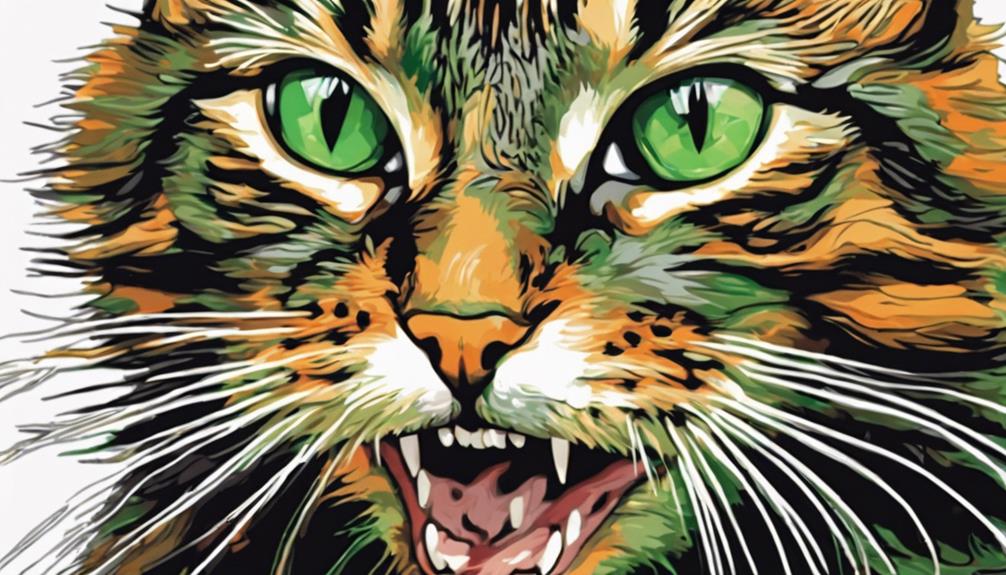
Exemplifying power and resilience, fierce and strong cat names serve as ideal monikers for felines with commanding personalities. These names, such as Thor, Athena, Hercules, Valkyrie, and Titan, exude strength and fearlessness, drawing inspiration from mythology, warriors, and powerful figures. When choosing a fierce and strong name for your cat, you not only showcase their inner strength but also highlight their fiery spirit.
These names are perfect for cats who command attention and possess a bold demeanor, reflecting a sense of power and resilience. By giving your cat a name that embodies strength and fierceness, you're acknowledging their unique personality and emphasizing their fearless nature.
Whether your cat struts around the house like a mighty warrior or exudes a quiet strength, a fierce and strong name can be a fitting tribute to their commanding presence. So, consider these powerful monikers when looking for a name that truly captures your cat's indomitable spirit.
Frequently Asked Questions
What Are Some Badass Names for Cats?
We've got some fierce cat names loaded with attitude and strength. Think legendary figures like Cleopatra, Spartacus, and Capone for a badass touch. These names pack a punch for cats with serious personality!
What Was Angry Cats Name?
We loved Grumpy Cat, also known as Tardar Sauce, an internet sensation due to her perpetually grumpy face. Despite her angry look, she brought joy worldwide. Her feline dwarfism and underbite made her unique.
What Cat Names Mean Strong?
We love names like Leo, Valkyrie, and Titan for strong cats. These names evoke power and resilience, perfect for our fierce feline friends. They inspire confidence and reflect our cats' determined and bold personalities.
What Are Some Fighter Cat Names?
We love fighter cat names for their bold and powerful vibes. Names like Warrior, Valkyrie, Ninja, Gladiator, and Samurai. They reflect bravery, courage, and tenacity. These names add an extra layer of badassery to our feline friends.
Conclusion
To sum up, choosing a fierce and angry cat name can be a fun way to showcase your pet's personality. Whether you opt for a lion-inspired name like 'Simba' or a villainous name like 'Maleficent,' the options are endless.
For example, my friend named her feisty feline 'Thor' after the mighty Norse god of thunder, and it suits his fiery temperament perfectly. Remember to choose a name that not only reflects your cat's fierceness but also brings a smile to your face every time you say it.
As our Editor-in-Chief, James plays a pivotal role in ensuring the quality and integrity of our content. With a keen eye for detail and a passion for storytelling, James oversees the editorial process here at A Place for Animals. With years of experience in content editing, James ensures that every piece of content meets our high standards of accuracy and clarity. Under James’ guidance, you can rest assured that the content you read is informative and impeccably crafted.
Dogs
Is Dieffenbachia Toxic to Dogs?

Dieffenbachia is toxic to dogs because it has calcium oxalate crystals, causing severe mouth irritation and painful sores. Symptoms include drooling, vomiting, and difficulty swallowing. Immediate vet help is necessary. Treatment may involve flushing the mouth and providing pain relief. To avoid exposure, keep plants out of reach and train dogs not to chew on them. Deterrent sprays can help. Be cautious on walks to prevent outdoor ingestion. Educate yourself and others about Dieffenbachia's danger to pets for their safety. Learn more about symptoms, diagnosis, treatment, and prevention measures.
Key Takeaways
- Dieffenbachia is toxic to dogs due to insoluble calcium oxalate crystals.
- Ingestion causes severe oral irritation, leading to painful ulcerations.
- Symptoms include drooling, vomiting, and difficulty swallowing.
- Immediate veterinary attention is crucial if ingestion occurs.
- Prevent exposure by keeping plants out of reach and educating on toxicity.
Potential Dangers of Dieffenbachia for Dogs
We must be aware of the potential dangers Dieffenbachia poses to dogs due to the presence of insoluble calcium oxalate crystals that can cause severe oral irritation. These crystals, if chewed on, can lead to painful ulcerations in a dog's mouth, tongue, and lips.
This oral irritation can be quite distressing for our furry friends and may result in symptoms like excessive drooling, vomiting, and difficulty swallowing. It's vital to understand that Dieffenbachia is toxic to dogs, and any ingestion of this plant should prompt immediate veterinary attention.
Our pet's health is paramount, and seeking professional help promptly can prevent further complications. Veterinarians may provide treatment such as pain medication and gastroprotectant medication to help alleviate the discomfort caused by Dieffenbachia ingestion.
Symptoms of Dieffenbachia Toxicity in Dogs
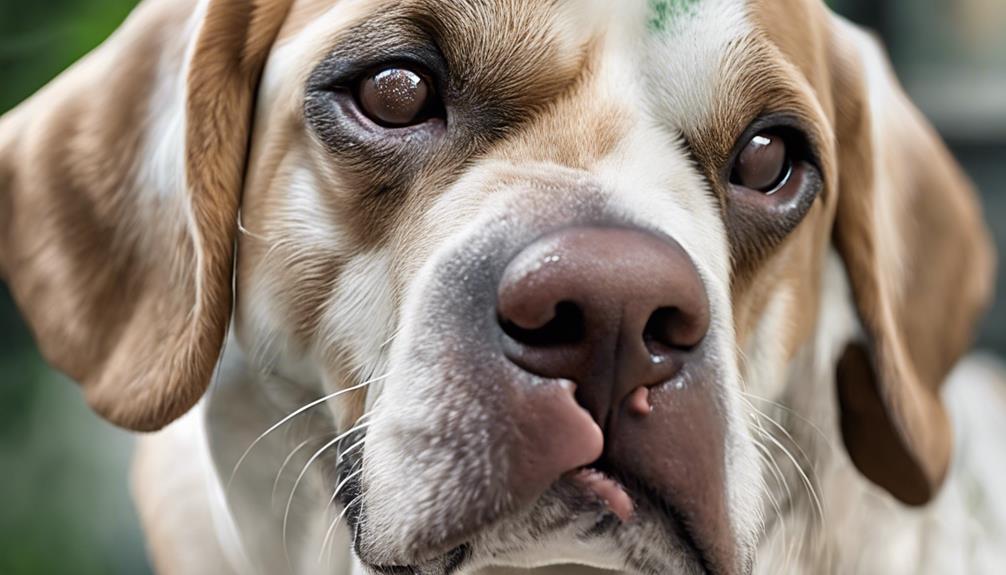
After ingesting Dieffenbachia, dogs may exhibit symptoms of toxicity such as intense burning and irritation in the mouth, tongue, and lips, along with excessive drooling and difficulty swallowing. These signs can be distressing for your furry friend, causing discomfort and potential health risks.
If your dog starts lip-smacking, avoiding food and water, or pawing at their mouth after encountering Dieffenbachia, it's essential to act promptly. In more severe cases, Dieffenbachia toxicity in dogs can progress to respiratory swelling, vomiting, and even allergic reactions.
Immediate veterinary attention is highly recommended if you suspect your dog has been poisoned by Dieffenbachia to prevent further complications. Your veterinarian may provide treatment such as pain medication and gastroprotectants to alleviate the symptoms and aid in your dog's recovery.
Diagnosis of Dieffenbachia Poisoning in Dogs

Diagnosing Dieffenbachia poisoning in dogs typically involves identifying common symptoms such as oral irritation, excessive drooling, vomiting, and difficulty swallowing. If your dog has ingested any part of the Dieffenbachia plant and is displaying these signs, it's essential to seek veterinary attention immediately.
Your vet may perform an oral examination to check for any plant residues in your dog's mouth or throat. Blood tests could also be conducted to detect any abnormalities associated with Dieffenbachia Poisoning, such as insoluble calcium oxalate crystals.
In some cases, imaging tests like X-rays or ultrasounds may be utilized to evaluate the extent of damage caused by the plant ingestion. Providing your vet with a sample of the plant your dog consumed can aid in an accurate diagnosis.
Treatment Options for Dieffenbachia Toxicity
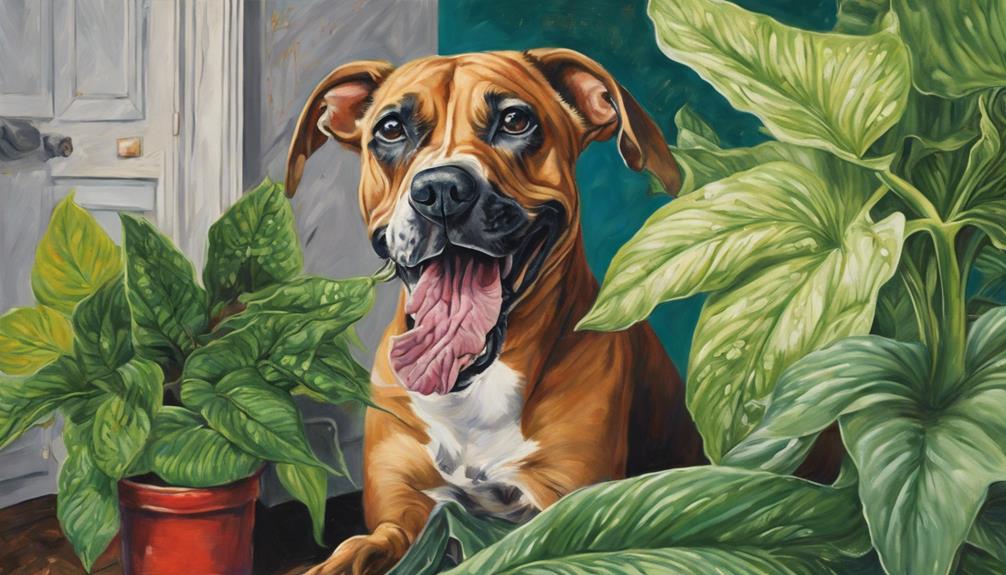
Upon identifying Dieffenbachia poisoning in dogs, the immediate focus shifts to implementing effective treatment options to address the toxicity. Here are some vital steps to take into account:
- Flush the Mouth: Flushing the mouth to remove any remaining pieces of the Dieffenbachia plant is essential to prevent further absorption of calcium oxalate crystals.
- Pain Management: Administering painkillers and protecting the gastrointestinal system can help alleviate discomfort and aid in the recovery process.
- Eye Examination: If the dog's eyes have been exposed to the plant, immediate treatment with saline solution is necessary to prevent additional damage.
- Skin Irritation: Managing skin irritation from contact with the Giant Dumb Cane plant involves washing the affected area with warm, soapy water and using prescription cream if needed.
- Seek Veterinary Care: Immediate veterinary care is crucial for proper diagnosis and treatment of Dieffenbachia toxicity in dogs. Veterinarians can provide specialized care and monitor the dog's progress closely.
Preventing Dieffenbachia Exposure in Dogs

To prevent Dieffenbachia exposure in dogs, it's important to place these plants out of their reach to avoid ingestion. This plant contains insoluble oxalate crystals that can be toxic to dogs and cats if ingested.
Training dogs to avoid chewing on houseplants, including Dieffenbachia, is vital for their safety. Additionally, consider using deterrent sprays or barriers to further safeguard your pets from accessing Dieffenbachia.
When taking your dog for walks, be vigilant and prevent them from ingesting any parts of the plant they may encounter outdoors. Educating family members and visitors about the toxicity of Dieffenbachia is essential to guarantee overall pet safety.
Frequently Asked Questions
What Happens if a Dog Eats a Dieffenbachia?
If a dog eats Dieffenbachia, it can lead to severe oral irritation due to toxic calcium oxalate crystals. Symptoms include excessive drooling, vomiting, and trouble swallowing. Chewing on Dieffenbachia releases these harmful crystals, causing painful mouth ulcers in dogs.
Immediate vet care is essential to prevent complications. Treatment may involve pain and gastroprotectant meds. Keep your pooch away from this plant to avoid these risks.
What Is the Most Poisonous Plant for Dogs?
The most poisonous plant for dogs is the Dieffenbachia. Ingesting this plant can lead to severe symptoms like oral irritation and difficulty swallowing. If a dog consumes Dieffenbachia, prompt veterinary care is essential to prevent potential fatalities.
Treatment may involve flushing the mouth, pain management, and safeguarding the gastrointestinal system. Proper diagnosis through blood tests and imaging is vital in cases of Dieffenbachia poisoning in dogs.
Are Pothos Toxic to Dogs?
Pothos plants are toxic to dogs, causing mouth and tongue irritation if ingested. Symptoms of Pothos toxicity include vomiting and increased salivation.
It's important to keep Pothos away from pets to prevent poisoning incidents.
Are Ivy Plants Poisonous to Dogs?
Ivy plants can be toxic to dogs, causing rash, breathing issues, coma, or paralysis. Despite their innocent appearance, they pose serious health risks.
It's crucial to keep them out of reach to protect our furry friends. Awareness and prevention are key to safeguarding dogs against these toxic effects.
Conclusion
To sum up, it's vital to keep dieffenbachia plants out of reach of your furry friends to prevent potential toxicity. Remember, even though dieffenbachia may look appealing, it can be harmful to dogs if ingested.
By being mindful of the symptoms and taking precautions, you can guarantee the safety and well-being of your beloved pets. So, why take the risk when you can easily avoid it by being proactive and cautious?
Dana is our Lead Content Writer, bringing a wealth of knowledge and expertise to our team. With a background deeply rooted in animal studies and a profound love for all creatures, Dana is dedicated to crafting engaging and informative content that resonates with our audience. With Dana at the helm, you can trust that our content is accurate and engaging, catering to the diverse interests of animal enthusiasts everywhere.
-

 Vetted2 months ago
Vetted2 months ago15 Best Cat Foods for Managing Hyperthyroidism – Vet Approved and Feline Friendly
-
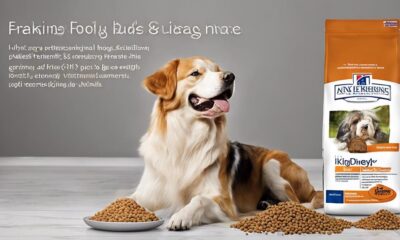
 Vetted2 months ago
Vetted2 months ago15 Best Dog Foods for Kidney Disease – Expert Recommendations for Your Pet's Health
-

 Vetted2 months ago
Vetted2 months ago15 Best Wet Cat Foods for Older Cats to Keep Them Healthy and Happy
-

 Vetted2 months ago
Vetted2 months ago15 Best Fresh Dog Food Delivery Services for Your Pup's Health and Happiness
-

 Vetted2 months ago
Vetted2 months ago14 Best Homemade Dog Food Recipes Your Pup Will Love – Vet Approved & Nutritious
-

 Animal Facts2 months ago
Animal Facts2 months agoSpring Animals: A Guide to Seasonal Wildlife
-

 Cats1 month ago
Cats1 month agoCat Weight Chart by Age: Kitten to Senior in Lbs
-

 Cats2 weeks ago
Cats2 weeks agoTop 5 Cat Breeders in Arkansas: A Guide





















